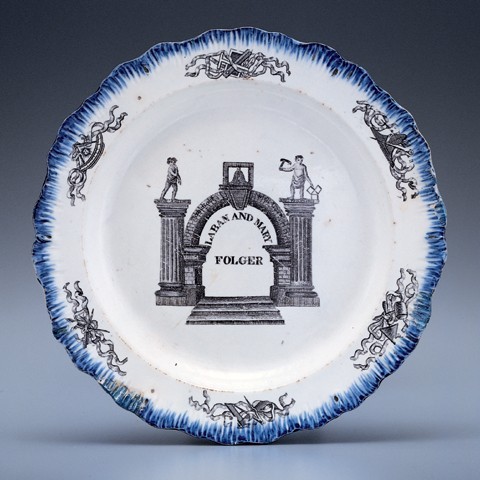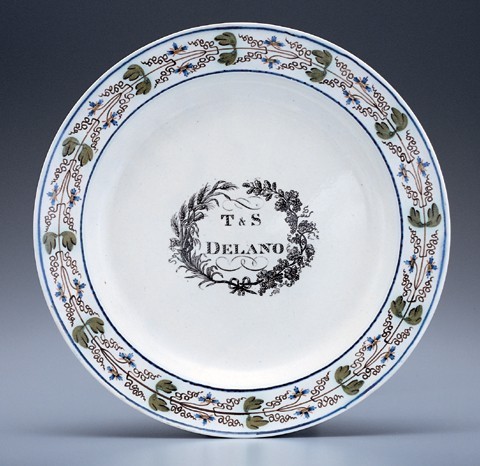
Plate, England, possibly Liverpool, ca. 1796. Pearlware. D. 8". (Collection of author; photo, Gavin Ashworth.) Inscribed in enamel “LABAN AND MARY FOLGER.”

Plate, England, possibly Liverpool, ca. 1794. Pearlware. D. 9 7/8". (Collection of author; photo, Gavin Ashworth.) Inscribed in black transfer print “T & S DELANO.”
Two pearlware plates with apparent American connections have recently been found in New England. The first plate is eight inches in diameter and has a molded blue shell edge. Around the rim are transfers of various woodworkers’ tools: a compass, a T-square, a ruler, a hammer, a chisel, and what appears to be feathers or quills (fig. 1). The center has the typical Masonic columns and archway, with symbolic figures on each column. Across the left-hand column is written “Virtue & Silence,” and on the right hand column is “True Friendship.” There is also something written on the arch, which is partly indecipherable. It says “...with Love.” Under the arch are the names “LABAN AND MARY FOLGER,” hand painted in black enamel.
The assumption is that this is a marriage plate, and research indicates that Laban and Mary were married on October 11, 1796, in Gloucester, Massachusetts. The marriage was also filed on Nantucket (Laban’s birthplace) and in Boston (Mary’s birthplace). The pearlware body and style of the plate corresponds nicely with this time period. Laban was the son of Benjamin and Phebe (Worth) Folger, and records indicate that the family left Nantucket sometime before 1796. Mary was the daughter of Elijah and Eunice (Sargent) Mayhew of Boston, although Elijah was originally from Newburyport, Massachusetts. One would assume that Laban Folger was a man of some means to have had this plate, and possibly other pieces, made to order in England. His status as a Mason was obviously important to him. His death is recorded in Montreal, Canada, on April 19, 1810. Between his marriage and his death, no information could be found, nor any indication of children from the marriage. Mary died in Andover, Massachusetts, on May 3, 1817. We can only surmise that Laban may have been a “black sheep” and had taken off for Canada shortly after his marriage.
The second plate is just as much of a mystery. This plate is nine and seven-eighths inches and has a plain edge with hand painted blue owers, squiggles, and leaves. In the center is a transfer wreath of wheat, grapes, and the initials and name “T & S DELANO” (fig. 2). This type of wreath is sometimes associated with the Masons. Delano is also a name connected to Nantucket. Records show that a Thomas Delano married Susannah Tallman in New Bedford, Massachusetts, on December 18, 1794. Thomas is listed as being “of Nantucket” at the time of the marriage. Thomas drowned in Buzzard’s Bay, near New Bedford, on October 6, 1820. It is possible that he was a fisherman. Susannah died on August 28, 1855, in New Bedford at age seventy-eight. Again, it is assumed that the plate was a marriage plate, and therefore was made in England in 1794.
We have not seen any other plates that match these, although it seems that if a transfer print was made for each of the plates, there would have been more pieces made. A search through books on transfer-printed English ceramics did not reveal transfers similar to those on the Folger plate, although there are many instances of transfer-printed designs with hand written names, especially from Liverpool.
Joyce Hanes
Hanes and Ruskin Antiques
<ljhanes@connix.com>
